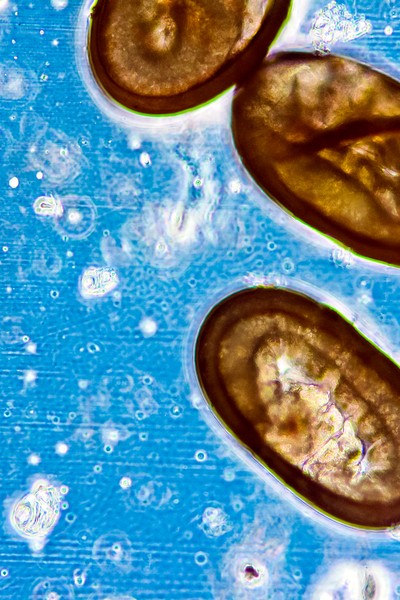DOG PARASITES
There are two types of parasites; internal and external. Internal dog parasites are those which normally cause intestinal problems. Those include: hookworms, roundworms, coccidia, giardia and whipworms. Probably, the most important internal non-intestinal parasite is heartworm disease which is transmitted to the dog via a mosquito bite and development of adult worms in the heart 6 months later. External dog parasites are those that live on the skin such as: fleas, ticks, demodectic and sarcoptic mange, ringworm and ear mites.
Dog parasites are exactly that; organisms that benefit at the expense of the host. The dog or cat gets zero benefit; NADA! In young and old animals, dog parasites drag an animal down. If they are carrying another condition like parvovirus; the parasitic condition will make the latter worse and harder to convalesce from. Particularly in the young puppy, dog parasites can lead to detrimental anemia and diarrhea. All of that leads to slower growth, dehydration and a lackluster coat. If not corrected, this will lead to an adult dog with a weakened immune system making it more susceptible to many diseases and hence a shortened life.
INTERNAL DOG PARASITES
Enjoy the interactive accordion learning about internal dog parasites in the puppy.
Hookworms can cause severe anemia in small puppies. They are true bloodsuckers. One worm can suck about 0.5cc of blood per day. This robs the puppy of nutrients. An animal is infested via nursing from its mother or by swallowing the eggs when smelling stools of another hookworm infested dog. They are very small and rarely seen in the stool but easy to see under the microscope. The big picture to the right of this is a microscopic view of hookworm eggs. Treatment is with pyrantel or Panacur®
Coccidia are different types of parasites. They are not worms but uni-cellular organisms that reside in the cells lining the small intestine. Most puppies contact this from the mother that is eliminating the parasite in her stool. This organism reproduces like clockwork and every 2-3 weeks (due to the intestinal cell damage) causes a severe bout of bloody diarrhea. This can cause anemia. Treatment is with Albon® or other sulfonamides for 3-4 weeks.
Roundworms in puppies can cause a lot of nutritional deficiencies and loose stool. These parasites are usually transmitted to puppies via lactation or from a mother’s feces that contain the eggs. A young puppy with just roundworms is usually presented with a distended or overly full abdomen. When the worm passes, they look like spaghetti and this is what I usually ask clients if this is what they look like. Larva pass through the intestine to the lung and the larva are coughed up and swallowed hence continuing the life-cycle. Treatment is with pyrantel or Panacur®.
Whipworms cause anemia, loss of condition and weight loss in severely infected puppies. Cats rarely, if ever, get whipworms. Transmission is always via feces contaminated with the whipworm eggs. Most adults live in the cecum and can produce colitis. In the puppy treatment is usually with Drontal Plus® or Panacur®. Control in the adult dog is usually by using a once a month heartworm preventative such as Interceptor® or Trifexis®.
Heartworm in the puppy is not a real concern until the animal is 6 months of age or older. Any dog over 6-8 weeks of age up to 6 months of age can be put on a once a month preventative without having a blood test done. It is impossible for any dog under 6 months to have adult heartworms as it takes 6-8 months for the parasite to grow to adulthood in the right ventricular chamber of the heart. Most veterinarians will start heartworm preventative during one of the vaccination puppy visits.
EXTERNAL DOG PARASITES
Enjoy the interactive accordion on puppy external dog parasites.
Ticks are dangerous on puppies, and like fleas, are picked up from the mother plus also from the environment. They are blood suckers and can cause anemia in the puppy. They also transmit: Rocky Mountain Spotted Fever, Babesiosis, Ehrlichiosis, Lyme Disease and other tick borne diseases. Ticks on puppies are best controlled by shampooing with Mycodex® shampoo (minimum 8 weeks) or if old enough, with a once a month flea/tick product or a Preventic® collar containing amitraz.
Ringworm is actually not caused by a worm but by a fungus known as Microsporum canis. It is relatively easy to eradicate on the puppy but since the fungus produces so many spores, environmental control is extremely difficult. Frequent vacuuming and changing of the bag and disinfecting animal bedding’s with a 1 part Clorox to 10 parts water rinse may help. Lesions are usually pronounced around the face, forehead and forelimbs. Employing a Woods lamp, the fungal organisms fluoresces a bright green color; diagnostic of ringworm. Culturing is another way. This parasite lives in the hair follicles on the skin so doctors have to get a deep skin scraping which may cause some minor bleeding. Treatment is with products containing miconazole or lime sulfur dips. If severe, oral medications may be employed.
Although seen in cats more often than dogs, ear mites (Otodectes cyanotis) can cause ear infections in puppies. Many times they originate from a mother harboring them. They climb off the mother and head to a puppy’s body where they than move to the ears. These parasites have teeth so they will chew and irritate the external ear and in untreated cases, they can chew through the tympanic membrane causing hearing loss. Characteristic of many ear mite infections is the typical dark waxy material seen in the ear canal. The mites are small and white and can easily be seen using an otoscope or under a microscope. There are drops available containing pyrethrins or Tresaderm®. Treatment takes about 3 weeks.



